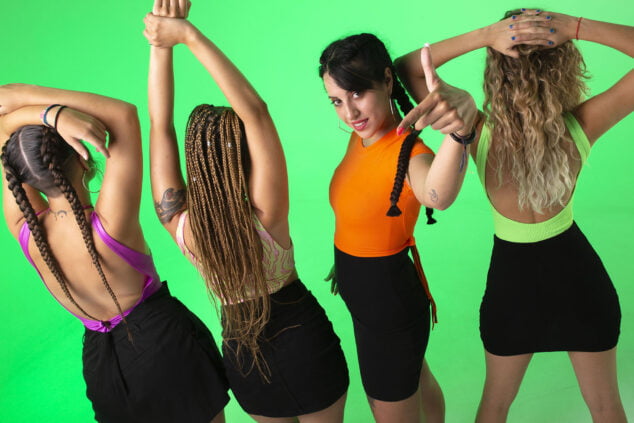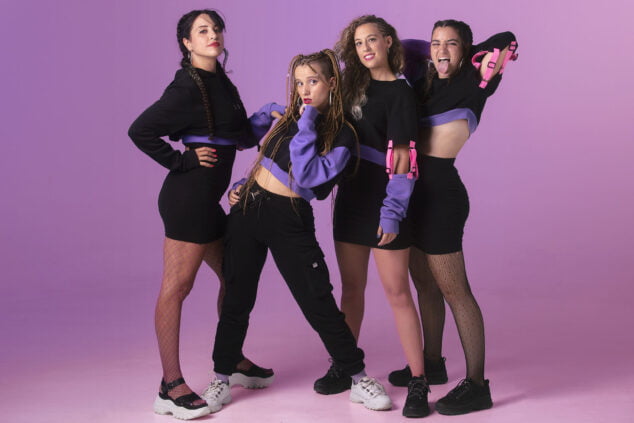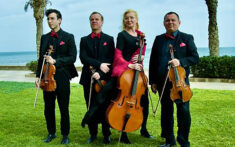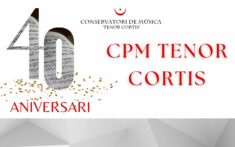On October 11, one of the most anticipated events of the year will take place in Dénia. Zoo and Maluks will finally give the promised concert that they had to postpone in Parties Dénia for the positive of any of the participants. It was the most important day of that Festiu 2021, heading the bill with one of the largest concerts organized in the city in recent years. But, things of the pandemic.
We were also taken by surprise by the postponement of this concert, having published a few days before interview with Panxo, Zoo singer, to talk about his performance in Dénia. More serious was the case of Maluks, who had to withhold the interview until today, when we can finally get it out.
Maluks begins his career in a time more than difficult, but with great enthusiasm and a groundbreaking bet. Four young people make up the training, three of them on vocals and a fourth in production. Maria deltell She is the group's DJ, a position that men still tend to occupy today within this type of group. With her we talked about the presentation tour of her first album, We are and we vibrate, and his concert in Dénia.
QUESTION. You have been active for a short time, having perhaps touched the strangest time. But, in order not to get ahead of ourselves, how was Maluks born?
ANSWER. Maluks was born in 2019 by an initiative of Marina (Bolea), who had always had the illusion of making a music group. With Nuria (Pons), who are lifelong friends, decided to set up the project. They had already played together, since Nuria played the cello and Marina the violin. They met Laura (Honorblonde), also a violinist, in the Philharmonic Orchestra of the University of Valencia.
But they liked to sing and they wanted to disconnect or do something other than classical music. They radically changed their concept, so they started looking for a person to produce, to act as a DJ, and they contacted me when they saw that had played in different festivals. That's when all the soiree by Maluks.
Q. The group is four women, being entirely female, something that unfortunately is not very common. Do you think that groups like yours are now having more possibilities or support from the public than a few years ago?
R. More facilities no. The facility is the same as it was before. Yes there has been a change of consciousness, although it may not be as important as we would like. But it is true that We have lost our fear to stop being a passive object that goes to festivals, that looks at groups of uncles, because it has always been groups of men who have taken over the posters and festivals, to become an active object. And we, dedicating ourselves to music and being musicians, we could do it too. It was as easy as raising it and going on stage.
Although there is a lot of work to do In this area, it is true that there are more and more women.
P. Also, listening to some speeches that are normalizing in recent months, it seems more important than ever that women have the same opportunities to approach a microphone.
R. Yeah right. There must be the same opportunities. But we must lose fear, especially. We have to be more sure of ourselves and have the initiative to form a project.
Because in the end they are desire, illusion, obviously training ... And If you go ahead knowing that you want to achieve a goal, in the end you achieve it. We marked it for ourselves to make a group that would have a coherence.
It was a lot of work and many hours of dedication, but now we are beginning to see the fruits and we are very happy.
Q. You said before that part of the group comes to be trained in classical music, however in your songs there is a great influence of Latin American rhythms, perhaps more distant from the usual in the area. What is the reason for this very American influence?
R. Although we like all kinds of music and all kinds of rhythms, we did want our group to have Jamaican and Latin roots because it is the music we listen to the most. We wanted to make a fusion between those two variants, that it was something very tropical, very Caribbean and danceable, so that people would have a good time listening to us. So we will also have a good time on stage (laughs).
"If no one sings in Valencian, and people hide our language, no one will do it for us, we are the only ones who can do it"
P. However, many of your lyrics are in Valencian. Was it something that you were clear from the beginning?
R. Singing in Valencian was very important for us. On the issue of making women visible, if we, as women, do not make a speech on the stage, no one will do it for us. And on the subject of language the same thing happens: If nobody sings in Valencian, and people hide our language, no one will do it for us, we are the only ones who can do it.
It was our language of expression, so it came naturally. Laura, for example, is from Albacete and she does sing in Spanish, which is your language and the one you feel most comfortable with. The rest is in Valencian, so we sing as we express ourselves.
Q. At the beginning of this year you released your first album, We are and we vibrate. They may have already told you, but you were very brave in the middle of the pandemic.
R. Yes, the truth is that we just finished the album during the pandemic. It helped us to finish itBecause if we had had as many concerts as this year it would have been very difficult to dedicate ourselves exclusively to the album.
And at some point we had to get it out. If we waited for everything to be normal as before ... We still don't even know when it will be.
So we think that the best thing would be to remove it at the beginning of the year, that people began to listen to it and that in summer, when we had concerts, even though they were not multitudinous as before, that the songs were already known.
If we hadn't taken it out, we might have disappeared from the scene, after not publishing anything for so long.
P. Also, they are all rhythms, as you say, very festive that now have to live with the chairs in front of the stages. Although we are in a pandemic, is it a good time to party?
R. It's always a good time for the party (laughs). There is a lot of control, many security measures at concerts and festivals. People can have a good time. It's another concert concept, but in the end you are with friends, making a beer and listening to the songs that you like.
In Catalonia they let the public stand in front of the chair, without moving from the site. And seeing people jumping in their places with their arms raised already made us think that everything was returning more and more to normal.. And little by little everything will become more normal.
Q. You said in an interview at the beginning of presenting the album that you were afraid of how you would do the tour or if there would be. A few months have passed and you talk about concerts in Catalonia, now you have the one in Dénia ... Are you more optimistic?
R. The truth is that we are very happy with the welcome we are having. We were very scared when we had to close the summer tour, because we did it in January, in full spike in infections. There we had no idea what would happen.
But after a few months, in March I would say, hiring skyrocketed, because everyone wanted to have their concert in their town hall, their town, their auditorium ... That means that people are there and want to meet us, and for us it is very important with what is happening.









They say: »women have lost their fear, ceasing to be a passive object that goes to festivals… ..» Well, they are late, you are xiquetas. Long before they have existed and there are excellent female artists who fill and continue to fill soccer stadiums with their music and shows. Now it turns out that women have never sung. The youth today is of fire that to believe inventors of the cola soda borders on the ridiculous.